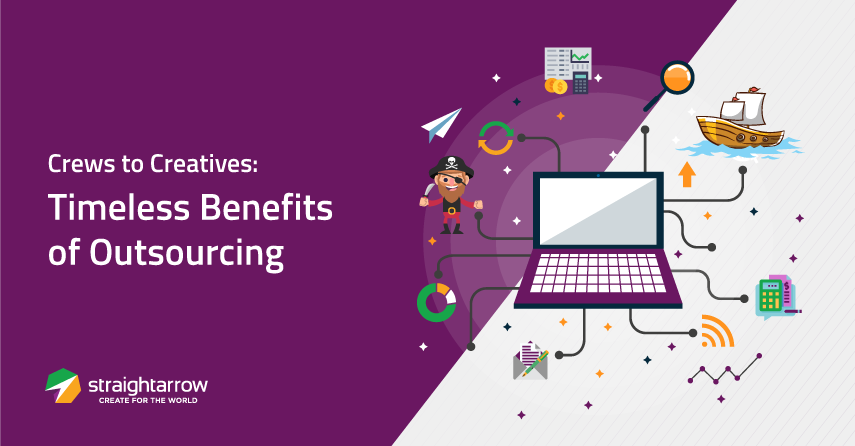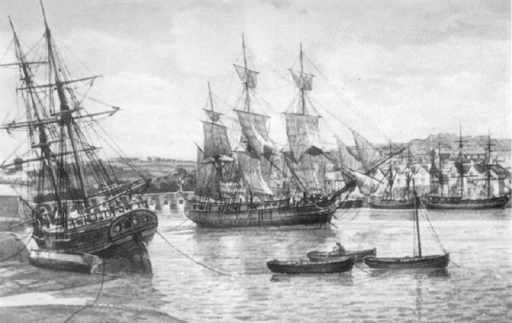
Thanks to technological developments, it’s become easier for companies to tap into resources from almost every corner of the world. With this advantage, more and more have embraced and enjoyed the benefits of outsourcing. But did you know the benefits of outsourcing before the dawn of the digital age?
Defining outsourcing
Based on research by the Bucharest Academy of Economic Studies, the concept of outsourcing originated from the American term “outside resourcing” and has been practiced since World War II.
Outsourcing in this context is defined as using external sources to support internal business processes.
Meanwhile, in a separate study from the University of Sao Paulo, it is said that the term “offshore outsourcing” was initially used way back in 1937 and is associated with the economist Ronald Coase who published a paper about this form of organizing a business.
While this suggests that the term was coined in the 1930s, the truth is that the practice of outsourcing itself can be traced further back.
Much like today, the idea of outsourcing first began as a response to a need and throughout its rich history, it has proven that its benefits are timeless.
What are the benefits of outsourcing?
Solving time and productivity issues
Evidence shows that one of the first instances of outsourcing dates back to the late 18th century. Ship commanders from that era typically lost half their crew while crossing the ocean. This was due to factors such as disease and harsh weather conditions.
To make it so that the ship’s crew was complete, commanders enlisted interested individuals from across the world to fill their ranks.
Imagine if ship commanders didn’t think to outsource crew members. What if they chose to sail back to their original destination just to complete their crew. That would have meant delays and wasted time, energy, and other resources.
So it's fortunate that the idea of outsourcing came about during that period, allowing ship commanders to save time and increase productivity.

A painting of 18th-century ships. Image by Mark Myers/Burton Art Gallery and Museum [Public domain], via Wikimedia Commons.
As the practice proved effective, outsourcing as a time-saving option didn’t end in the 18th century. In the decades that followed, companies would turn to law and accounting outsourcing firms to save time. They could concentrate on their business goals by offloading tasks and eliminating distractions.
Fast forward to the middle of the 20th century, where rapid technological developments paved the way for growth in the outsourcing industry.
In the 1970s and 1980s, businesses continued to use outsourcing to save time and increase productivity.
What does outsourcing mean to businesses?
It means bringing in higher profit. But outside of that, organizations who wished to compete globally recognized that outsourcing was a means to help them focus.
Outsourcing would ensure that experts handled non-critical functions, allowing business owners to direct their energies and time to the core functions of the business.
Today, the benefits that helped ship commanders from the 18th century still hold.
2016 data from Deloitte confirms that 57% of respondents outsource to focus on core functions.
The practice helps them eliminate time-consuming but non-critical functions such as marketing, information technology, and accounting.
Cost-effective solution
Aside from saving time and increasing productivity, outsourcing’s rich history also proved that the practice allows companies to save another valuable resource—money.
Let’s go back to the story of 18th-century commanders and crews. While their practice began as needed, they later embraced the economic benefits of hiring crew members at a lower cost. Similarly, industrial leaders from that time also realized the potential of outsourcing—to hire and migrate people with various skills at a more affordable price.
Outside of gathering new shipmates, outsourcing continued to become popular, and years later, in the 1990s, “cost-saving” became the buzzword.
Companies began regularly outsourcing to specialists in accounting, human resources (HR), data processing, internal mail distribution, security, plant maintenance, and similar business processes.
Businesses saw outsourcing as a cost-effective move that helped them ease the burden of hiring, managing, retaining, and training staff without sacrificing output quality.
Going back to Deloitte’s survey, 59% of respondents see outsourcing as a cost-cutting tool, which is the top reason they choose to outsource.
Critical to a global knowledge base
Another timeless benefit of outsourcing is access to a diverse knowledge base of expertise.
History shows that outsourcing has helped emperors, kings, and businesses gain expertise by hiring an external team to assist them.
Outsourcing dates back in the 18th century.
Born in 1672, Russia's late emperor, Peter the Great, modeled outsourcing years before his reign. In his 20s, he worked as a carpenter in Holland to study the craft of ship-building.
Upon his return to Russia at the beginning of the 18th century, Peter the Great brought a team of foreign craftsmen from several fields. These craftsmen would aid in building the new Empire, just as imported military and technical experts would teach tactical skills to his fellow Russians.
Because of these individuals, Peter the Great was able to develop Saint-Petersburg—a city that boasts rich culture and architecture. Thanks to the expertise of outsourced Italian architects and German engineers and headed by French architect Jean-Baptiste Alexandre Le Blond, Peter the Great found the perfect mix of tradition and innovation.
Peter the Great was not the only monarch able to develop a city through outsourcing. Japan’s Emperor Meiji sought foreign help to modernize their country in 1868. He hired foreign technicians, engineers, and military personnel.
These offshore teams helped set up factory systems such as model steel and textile manufacturing facilities. They also introduced knowledge of operating high-tech equipment and assisted in modernizing the Japanese armed forces.
Meanwhile, the decision to outsource accounting and legal functions grew rampant in Europe. Thousands of miles from Japan, case-law systems in Great Britain required people to settle business disputes with the help of qualified specialists.
Outsourcing in the 21st century
And now, almost two decades into the 21st century, technology has once again progressed in leaps and bounds. Previously outsourced tasks are now being automated with the help of artificial intelligence (AI) and machine learning. But this doesn’t mean that outsourcing has lost its relevance.
As technology evolves to address the demands of the modern workplace (such as eliminating routine work and clerical error), business needs also change.
Higher-level skills, including strategic thinking, problem-solving, and creativity, are now and will continue to be in demand.
For instance, the rise of digital marketing and automation has pushed companies to take their products and services to the digital space, which is a challenge all on its own.
Outside of the dilemma of brands competing for consumers’ attention, business models are evolving much quicker. Migrating online has also become synonymous with growth and innovation.
Companies now turn to strong strategists, creative thinkers, and storytellers to meet this challenge because of their expertise.
The 21st century is seeing outsourcing expand its scope to solve more problems.
The growth of CPO
This is evidenced by the growth of the Creative Process Outsourcing (CPO) industry, which aims to support clients with their creative needs.
Businesses of any size can now connect to the world and quickly turn to CPOs for tasks such as:
Similar to business process outsourcing, CPOs help companies focus on the core functions while enjoying a healthy level of profit.
It allows clients to maximize two valuable resources: money and time.
What’s ahead?
History has shown that outsourcing is the vehicle through which innovative solutions help ship captains, emperors, and businesses reach their “Northern Stars”—whether it is to save time, increase productivity, gain additional knowledge, or maximize expenses.
We expect it will continue to be a sailor of growth, both for businesses and offshoring companies, amidst continuous technological advancements.
Do you want to explore outsourcing for your business?

Originally posted by Neima Chowdhury on April 1, 2019. Updated by Maria Redillas on July 26, 2022.











Comments